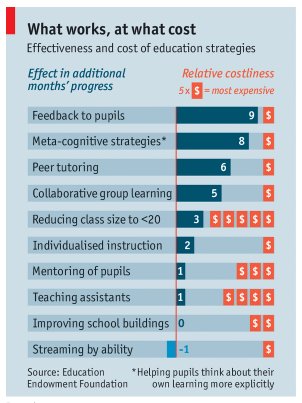Recent research into teacher development has confirmed that great teaching is the result of systematic efforts in schools to provide on-going support of growth. Conferences, guest speakers, and blogs are fine as far as they go, but the real benefits come when teachers work with others consistently on concrete goals with the opportunity for feedback.
Also interesting in this research is the benefit of some specific strategies to improve learning.
Some popular approaches, such as ability grouping and individualizing instruction, show minimal improvement or worse. Reducing class sizes, though somewhat effective, comes at a prohibitive cost.
What is most effective in improving learning, those items at the top of the chart below, show not just the greatest benefit but also at the least cost. Best of all, these strategies are available to all teachers in all classrooms, and do not require potentially disruptive or expensive restructuring of schedules.
Of course, not all methods are created equal, and while teaching students to think about their own learning (meta-cognitive strategies) fits very well in classical, Christian education, strategies such as peer tutoring and collaborative group learning require more careful application. If one thinks of peer editing as tutoring, and seminar discussions as collaborative learning, then these become easier to imagine as methods for classical, Christian schools.
Readers of Chappuis' Seven Strategies of Assessment for Learning will recognize the top two strategies as central to the Seven Strategies.

